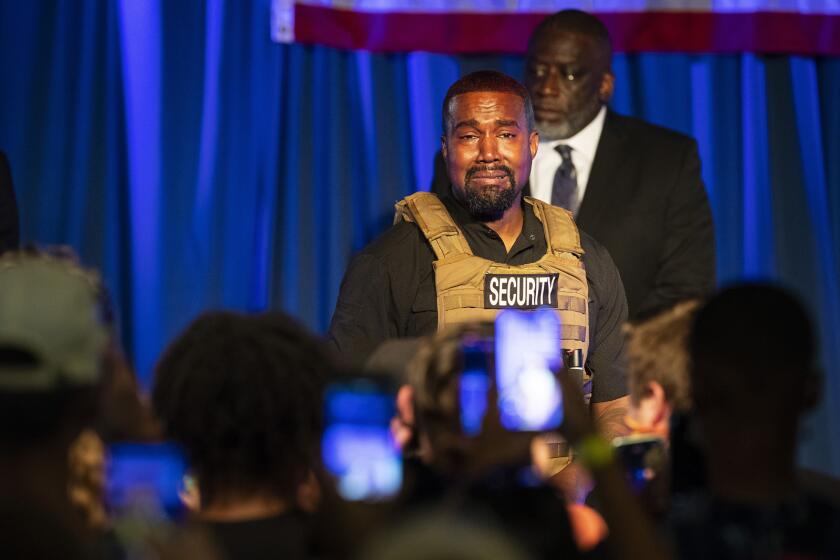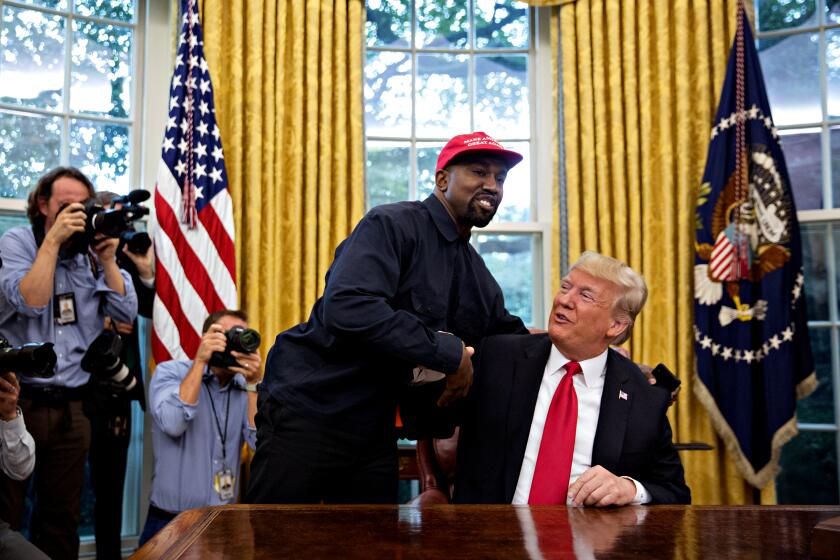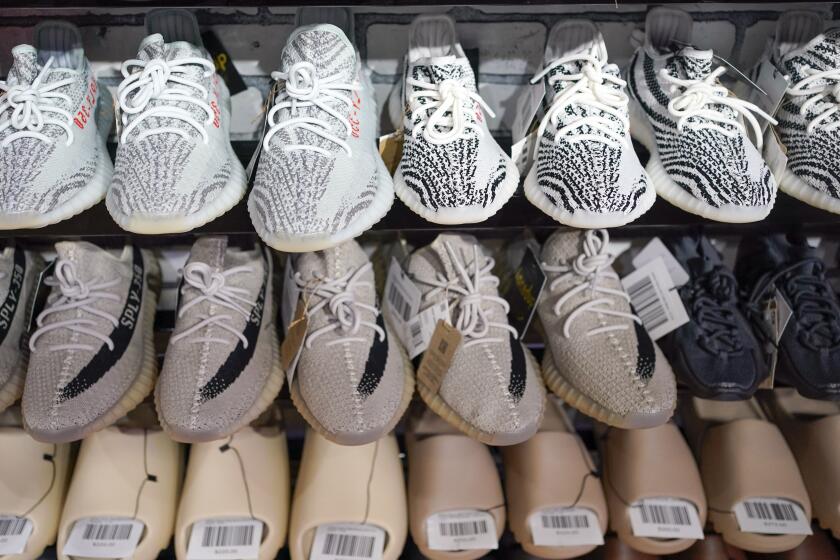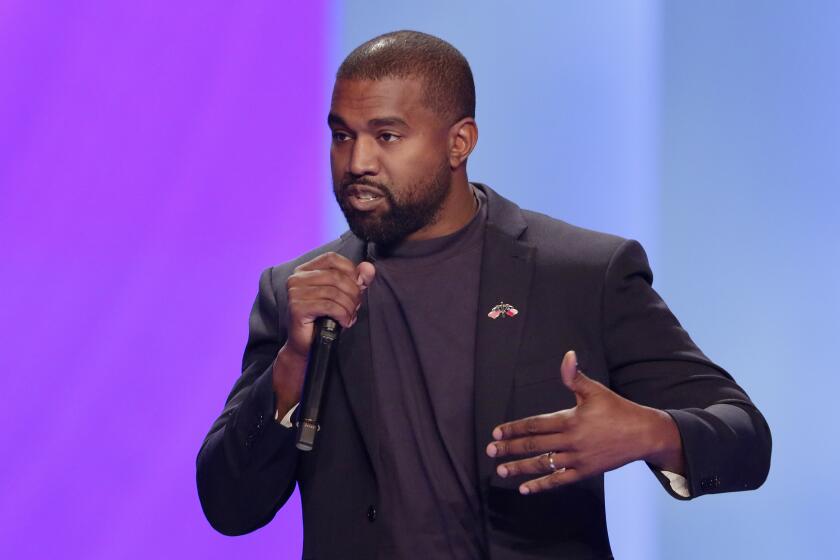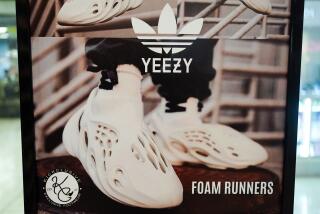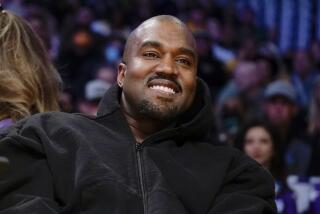Column: If Adidas cut ties with Ye over his antisemitic rants, why is it praising him and selling Yeezys?
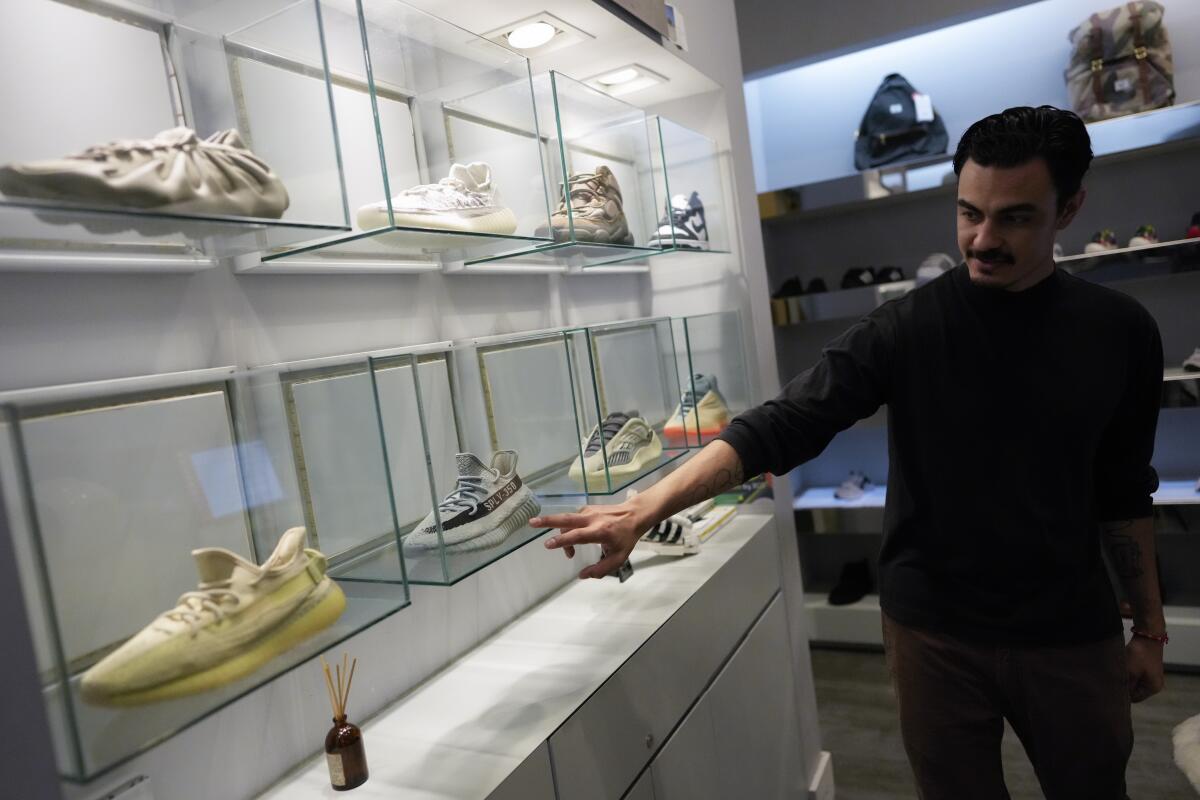
Anything was possible.
Adidas executives knew that back in 2013, when they signed the artist formerly known as Kanye West away from Nike. Companies shouldn’t get away with feigning shock after a provocative artist does something provocative.
Opinion Columnist
LZ Granderson
LZ Granderson writes about culture, politics, sports and navigating life in America.
By 2013, Ye, as he is called now, had already said President George W. Bush didn’t care about Black people. He had rushed a stage to insult Taylor Swift. Controversy was part of his brand. “Eccentric” behavior. A provocative genius. Ultimately a risk that the apparel company surmised was worth taking.
Then came his notorious meltdown, when he posted antisemitic messages on Twitter and Instagram a year ago. Adidas, his partner on the Yeezy line of sneakers, had a PR nightmare on its hands and said last October that it had cut ties with him.
The artist formerly known as Kanye West was once influential, but that never meant he deserved a platform.
But the company did decide to sell the shoes it had already made, donating some of the profits to organizations fighting antisemitism.
And then recently Adidas Chief Executive Bjorn Gulden casually played down the antisemitic tirade.
“I think Kanye West is one of the most creative people in the world,” Gulden said on a podcast about investing. “Very unfortunate, because I don’t think he meant what he said and I don’t think he’s a bad person. It just came off that way.”
One of Ye’s tweets was a threat to “go death con 3 On JEWISH PEOPLE.”
Hard to see the misunderstanding.
The rapper’s shocking praise of Hitler could be a twisted publicity stunt. Whatever it is, don’t blame it on mental illness.
So why is Adidas using a compliment sandwich to describe the controversy? Apparently some faction still views Ye as a risk worth taking.
The apparel company did just spend the summer raking in close to half a billion dollars selling shoes and other Yeezy items that I didn’t think anyone would want anymore. After Adidas said it was cutting ties with Ye, it was staring down the possibility of losing nearly $1.3 billion. But the plan to donate a portion of Yeezy shoe sales to charity — rather than destroying them — was successful. Adidas released a limited supply and made $437 million in the process.
The company wants to maintain the distance it has created from Ye while still cashing in on his fame. So after Gulden’s “I don’t think he meant what he said” remark came a statement from the company.
Adidas is releasing a second batch of high-end Yeezy sneakers after cutting ties with rapper Ye, formerly known as Kanye West.
“Our decision to end our partnership with Ye because of his unacceptable comments and behavior was absolutely the right one,” the company said. “Our stance has not changed: Hate of any kind has no place in sports or society, and we remain committed to fighting it.”
While selling Yeezys and defending Ye?
Anything is possible, I guess.
It’s just hard to believe the company that watched the artist make multiple hateful statements over the course of a decade in business together is really “committed to fighting it.” Feels more like damage control now that it’s their brand in danger of being damaged.
In recent months it announced a $1.1-billion partnership with Manchester United, greenlighted a second wave of Yeezy sales and saw its stock price recovering. The last thing Adidas needs is for the cavalier attitude of its chief executive to reignite the controversy. Adidas was getting what it wanted: It could sell Yeezys and also put out news releases saying it had cut ties with Ye.
Companies from Balenciaga to CAA to Adidas have cut ties with Ye amid antisemitic tirades. Now his Donda Academy is closing until next school year.
It’s a similar situation to what Pepsi did with Madonna 35 years ago.
The beverage company partnered with the controversial singer ahead of the release of her “Like a Prayer” album in 1989.
By then she had already angered the Vatican with “Papa Don’t Preach” and “Like a Virgin.” But casting Leon Robinson, who is Black, to play a saint-like figure in a music video and then making out with that figure in church while also dancing in front of burning crosses was … too far. Pepsi canceled airing the commercial, horrified that the provocative artist they signed to promote their soft drink had, you know, provoked people. Last week, more than three decades late, the beverage company finally shared the commercial on social media.
“Thank you for finally realizing the genius of our collaboration,” Madonna posted on Instagram afterward. “Artists are here to disturb the peace.”
Sounds good in theory.
Sounds great in the marketing department.
But when business leaders are reminded what sort of public figures they’ve made a deal with, commercials get canceled and shoes are taken off the shelf. The companies pretend they were blindsided. They say that had they known these artists would do something offensive, they would have looked elsewhere. They also try to keep cashing in on the connection, whenever it’s convenient.
When you team with someone as provocative as Ye, you know from the outset: Anything is possible.
More to Read
A cure for the common opinion
Get thought-provoking perspectives with our weekly newsletter.
You may occasionally receive promotional content from the Los Angeles Times.

